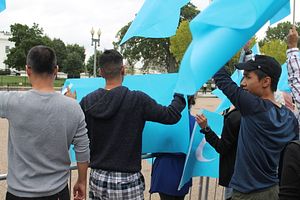“I wear a hat, get glasses, I cover my face. I’m in a free country but when I go to my people’s office, I cover my face. I didn’t even cover my face in China, but I cover my face here.” These are the words of a Uyghur, resident in the United States, earlier this year. The man, a carpenter back in his hometown, told Uyghur Human Rights Project (UHRP) researchers he was scared he would be noticed by the Chinese authorities when visiting our office in Washington, DC.
A new UHRP report, “Repression Across Borders,” documents how the Chinese government routinely carries out surveillance, threats and coercion on American soil to control the speech and actions of the estimated 1,500 to 5,000 Uyghur people living in the United States. This is an ambitious and well-resourced campaign affecting all Uyghur Americans, especially the many brave journalists, activists, and students engaged in raising awareness about the crisis of repression in their homeland.
The intimidation campaign constitutes an ongoing series of crimes committed with impunity on U.S. persons. It is illegal under U.S. federal and state law to issue threats that interfere with free-speech rights. For the Uyghur American community, the enduring and menacing presence of the Chinese government in their daily lives deprives them of their constitutionally protected rights and freedoms.
UHRP’s report details Chinese state pressure placed on Uyghur Americans to end activism highlighting dire human rights conditions in the Uyghur region. The threats come by text, chat apps, voicemail, email, and messages delivered by third parties; some members of the community report receiving such messages on a weekly or even a near-daily basis. Non-compliance could result in family members being taken to a concentration camp, where one and a half to three million Uyghurs and other Turkic peoples are interned.
These communications illustrate the way Chinese authorities apply pressure against Uyghurs abroad through their family members at home, adding to the extreme emotional distress of separated Uyghur families. That so many speak out anyway, despite the dire risks, demonstrates the resilience of Uyghurs in the United States.
In his 2014 book, The Globalization of Chinese Propaganda, Kingsley Edney describes how the Chinese state seeks “cohesion” between its overseas and domestic messaging. The method is to enlist actors abroad to rearticulate pro-Beijing viewpoints and suppress counternarratives. Silencing Uyghurs overseas is not only about control of all Uyghur bodies, regardless of location, but also an attempt to promote China’s ludicrous claim that the concentration camps are indeed “vocational training centers.” Denying overseas Uyghurs a voice means the world is deprived of knowing the true extent of China’s ongoing crimes against humanity.
This is a direct challenge to the sovereignty of the United States and the authority of the U.S. government to protect the rights of its citizens and legal residents. Like other illegal Chinese government influence operations on U.S. soil, Chinese government harassment and abuse of Uyghurs from California to Virginia should be a U.S. government priority.
We can build on measures limiting the reach of Confucius Institutes and the Chinese-state compromised tech company Huawei by taking legislative steps and deploying law enforcement to protect Uyghurs. This test of U.S. resolve impacts all of us, as the limitation of some U.S. citizens’ rights by a foreign power should always be unacceptable.
The first step is for Congress to pass the Uyghur Human Rights Policy Act of 2019 (H.R. 649 and S.178), and the UIGHUR Act of 2019 (H.R 1025). Both bills signal congressional alarm about the extreme human rights crisis in China, mobilize action to bring an end to the violations, and endorse multiple steps to protect the rights of Uyghur Americans, including investigation and accountability for Chinese officials implicated in the harassment of Uyghur Americans.
The role of law enforcement in this process is critical. The FBI should thoroughly investigate criminal harassment and intimidation of Uyghurs in the United States, and local law enforcement, particularly in northern Virginia where the largest Uyghur community is located, should work toward building a rapport with Uyghur residents.
All of this is achievable. It will protect Uyghur Americans from the long arm of Chinese repression and send a message to Beijing that an attempt to limit the rights of U.S. citizens and legal residents will not be tolerated. The former carpenter also told UHRP: “There are protests, and I want to go. My soul is there. I want to go.” Are we prepared to continue to allow a foreign government to deliberately suppress freedom of speech within U.S. borders?
Omer Kanat is Director of the Uyghur Human Rights Project.













